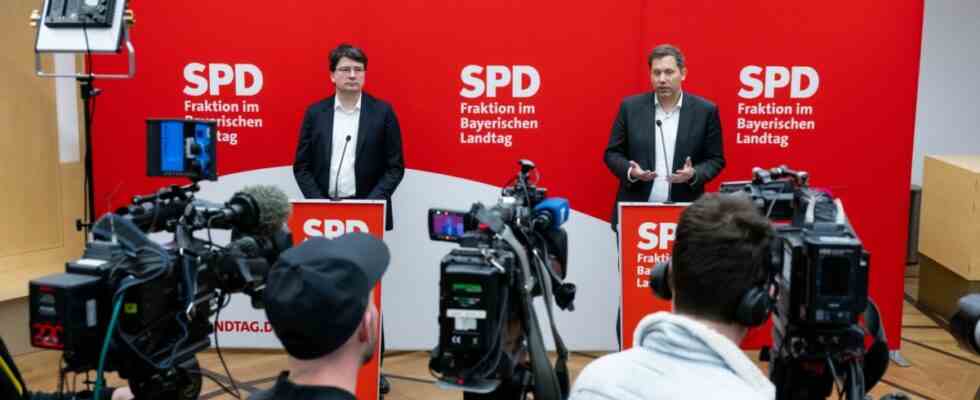No, it’s not the new defense minister standing at the front of the desk and kicking off the winter retreat of the SPD parliamentary group. Until recently, the SPD federal chairman Lars Klingbeil had been traded for the vacant post in the traffic light coalition. When he received a call from his office on Tuesday morning, employees of the Bavarian parliamentary group held their breath: a rejection? But that was only for the purpose of agreement, the new minister’s name is Boris Pistorius.
And Klingbeil can do what he was mainly invited to do in Munich: encourage people. In 2021, as Secretary General of the federal SPD, he was responsible for Olaf Scholz’s campaign, who was initially mocked for his chancellor ambitions and then won the race. This is roughly how Florian von Brunn – top candidate, head of the Bavarian SPD and parliamentary group leader – imagines the course of the state election year to be. Brunn listens carefully as Klingbeil says: only eleven percent had his party in a survey and when he talked about the chancellor’s goal, he was only “looked at with pity”. But: “It is worth fighting every fight, and we will show that in Bavaria.”
The eleven percent mentioned, rather less, are also the level at which Brunn’s Bavarian SPD is struggling. It was nine percent recently in the BR24 Bayern trend, in another survey then ten – roughly like in the 2018 election, when the SPD had experienced a historic debacle with 9.7 percent. The fact that nothing has changed since Brunn took over power in the state association (together with Ronja Endres as co-boss) and in the parliamentary group would not be enough. In addition to the recently confirmed electoral target of “15 percent plus x”, Brunn promised his comrades “an end to stepping around quietly”. He redeemed that. He is present in the media, often with a snappy slogan; Generally, Brunn prefers to bang the timpani rather than the snare drum. However, according to surveys, a traffic light in Bavaria is an almost unreachable distance. In addition, according to Bayerntrend, two-thirds of citizens think that things are fair overall in Bavaria. In any case, the core issue of the SPD, social justice, does not exactly act as a motor for a change of mood.
There is also the question of what damage remains from the debate about the now former Bavarian SPD Secretary General Arif Taşdelen. He resigned after the Jusos had banned him from speaking at events because he was said to have behaved improperly towards young women. A replacement has already been found: Ruth Müller, member of the state parliament, in tandem with Nasser Ahmed, Nuremberg’s SPD city boss. Star guest Klingbeil has congratulations and a warm hug ready for Müller on Tuesday. The whole Taşdelen case, regardless of the allegations, was not proof of harmonious party life. Brunn says he would have “wished for a different start to the year.” In short: Even the greatest visionaries are likely to have enormous problems imagining a Prime Minister Florian von Brunn at the moment.
Despite the poor starting position, the Bavarian and federal leaders of the SPD give good prospects on record – expressly not only according to the principle of hope. The focus of the “Social Policy for Bavaria” retreat in the Maximilianeum is on renewable energies and the construction of affordable housing. “We want to pull out all the stops in Bavaria for this,” says Brunn, for example, the “wind power stop” must be completely eliminated by the 10-hour distance rule. The SPD members of parliament will discuss their concepts, including education policy and the shortage of skilled workers, until Thursday.
And the narrative that is being planned for the election campaign goes like this: Bavaria can take an example from the federal government, from Olaf Scholz and thus from social democracy. Under the chancellor, “a new German pace was being driven,” explains Klingbeil, which can be seen in the construction of the new liquid gas terminals on the North and Baltic Seas. “We also need this new German pace in Bavaria.” So that the Free State is not left behind in the climate-neutral restructuring of the economy, the SPD is responsible. As a “driving force”.
Brunn and Klingbeil paint the exact opposite picture of Prime Minister Markus Söder (CSU). Söder “criminally neglected” renewable energies, constantly attracting attention with his blockade attitude and pointing his finger helplessly to Berlin, says Klingbeil. Ultimately, Söder is even a threat to Bavaria as an industrial location. But Brunn also wants to point to the federal government himself in 2023 – and make it clear to the voters that the chancellor’s party has a short connection, so Bavarian concerns can be adequately reported. Unlike the CSU, which no longer plays a role in Berlin. So it’s hoping for the chancellor’s bonus, both in terms of content and strategy. Don’t let polls deter you, see Scholz’s catch-up race in 2021, it said. Klingbeil says: “The decision will be made on election day.” Of course, he is planning supporting appearances in the state election campaign. Likewise the chancellor.

